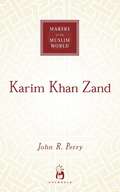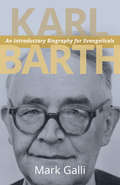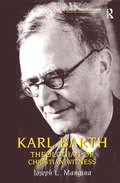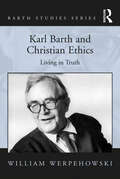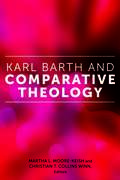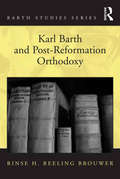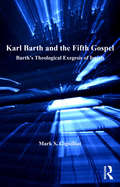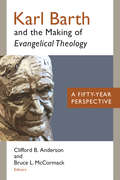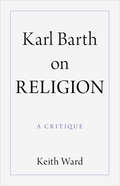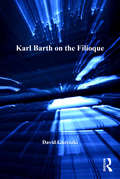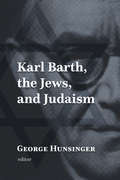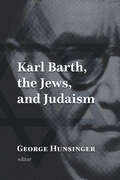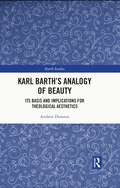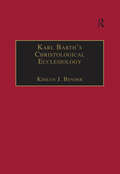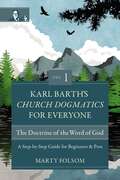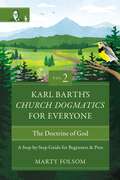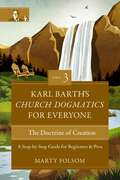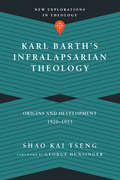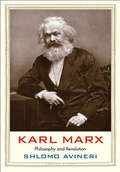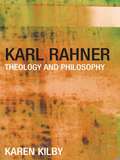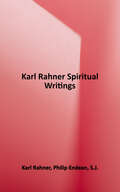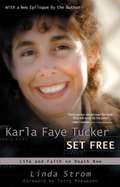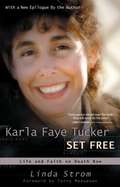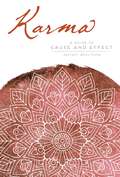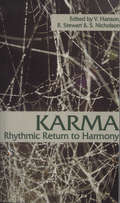- Table View
- List View
Karim Khan Zand: A History Of Iran, 1747-1779 (Makers of the Muslim World #12)
by John R. PerryA forward thinking and notably popular leader, Karim Khan Zand (1705-1779) was the founder of the Zand dynasty in Iran. In this insightful profile of a man before his time, esteemed academic John Perry shows how by opening up international trade, employing a fair fiscal system and showing respect for existing religious institutions, Karim Khan succeeded in creating a peaceful and prosperous state in a particularly turbulent epoch of history.
Karl Barth: An Introductory Biography for Evangelicals
by Mark GalliThis refreshingly accessible introduction to Karl Barth by Mark Galli takes readers on a whirlwind tour of the life and writings of this giant of twentieth-century theology. Galli pays special attention to themes and topics of concern for contemporary evangelicals, who may need Barth&’s acute critique as much as early-twentieth-century liberals did—and for surprisingly similar reasons.
Karl Barth: Theologian of Christian Witness (Great Theologians Series #Vol. 8)
by Joseph L. ManginaThe thought of Karl Barth (1886-1968) has undergone a remarkable renewal of interest in the past twenty years. Joseph Mangina's Karl Barth: Theologian of Christian Witness offers a concise, accessible guide to this important Christian thinker. Uniquely among introductions to Barth, it also highlights his significance for Christian ecumenism. The first chapter describes Barth's extraordinary life, from his youthful break with liberalism during the First World War, to his mature theology in the Church Dogmatics. Subsequent chapters offer a detailed reading of this magisterial work, and place Barth in dialogue with five contemporary thinkers: George Lindbeck on revelation, Michael Wyschogrod on election, Stanley Hauerwas on creation, Robert Jenson on reconciliation, and Henri de Lubac on the church. These ecumenical conversations not only set Barth's thinking in greater relief, but serve to demonstrate its continuing theological fruitfulness. The book concludes by examining Barth's wider significance for the church in our time.
Karl Barth and Christian Ethics: Living in Truth (Barth Studies)
by William WerpehowskiThis critical study of Karl Barth's Christian theological ethics discusses Barth's controversial and characteristically misunderstood ethics of divine command. The surprising relation of his 'divine command ethics' to contemporary 'narrative theology' and 'virtue ethics' and specific moral themes concerning bonds between parents and children, the nature of truth telling, and the meaning of Christian love of God and neighbor are all discussed. This book reveals Barth's richness, depth, and insight, and places his work in constructive connection with salient themes in both Catholic and Protestant ethics. Attentive to the fullness of Barth's Christological vision and to the purposes and limits of his reflections on the Christian life in pursuit of the good, William Werpehowski also advances conversations in Christian ethics about the nature of practical deliberation and decision, the orientation and dispositions that embody moral faithfulness, and the question and features of 'natural morality.'
Karl Barth and Comparative Theology (Comparative Theology: Thinking Across Traditions #7)
by Martha L. Moore-Keish and Christian T. Collins WinnBuilding on recent engagements with Barth in the area of theologies of religion, Karl Barth and Comparative Theology inaugurates a new conversation between Barth’s theology and comparative theology. Each essay brings Barth into conversation with theological claims from other religious traditions for the purpose of modeling deep learning across religious borders from a Barthian perspective. For each tradition, two Barth-influenced theologians offer focused engagements of Barth with the tradition’s respective themes and figures, and a response from a theologian from that tradition then follows. With these surprising and stirringly creative exchanges, Karl Barth and Comparative Theology promises to open up new trajectories for comparative theology.Contributors: Chris Boesel, Francis X. Clooney, Christian T. Collins Winn, Victor Ezigbo, James Farwell, Tim Hartman, S. Mark Heim, Paul Knitter, Pan-chiu Lai, Martha L. Moore-Keish, Peter Ochs, Marc Pugliese, Joshua Ralston, Anantanand Rambachan, Randi Rashkover, Kurt Richardson, Mun’im Sirry, John Sheveland, Nimi Wariboko
Karl Barth and Post-Reformation Orthodoxy (Barth Studies)
by Rinse H. BrouwerThroughout his magnum opus, Church Dogmatics, Karl Barth converses with the great theologians of post-reformation orthodoxy, quoting from works in his private collection. When Barth became Honorary Professor of Reformed Theology at the University of Göttingen in 1921, his knowledge of the Reformed tradition was practically non-existent; he quickly amassed his collection of ancient copies in order to acquire a thorough knowledge of orthodoxy. In Karl Barth and Post-Reformation Orthodoxy, Rinse H. Reeling Brouwer identifies and discusses the sources of Barth's conversations and analyses Barth's use and (mis)understandings of them. Each chapter focuses on one of the topics in Christian Dogmatics, with the last chapter exploring the way in which Barth's role as a reader of the 19th-century writer of a textbook on Reformed Dogmatics Heinrich Heppe influenced the ultimate shaping of Church Dogmatics. Reeling Brouwer offers a major contribution to Barth scholarship and an important resource for theologians as well as historians focusing on the post-reformation protestant theology.
Karl Barth and the Fifth Gospel: Barth's Theological Exegesis of Isaiah (Barth Studies)
by Mark S. GignilliatToday’s biblical scholars and dogmaticians are giving a significant amount of attention to the topic of theological exegesis. A resource turned to for guidance and insight in this discussion is the history of interpretation, and Karl Barth’s voice registers loudly as a helpful model for engaging Scripture and its subject matter. Most readers of Barth’s theological exegesis encounter him on the level of his New Testament exegesis. This is understandable from several different vantage points. Unfortunately, Barth’s theological exegesis of the Old Testament has not received the attention it deserves. This book seeks to fill this lacuna as it encounters Barth’s theological exegesis of Isaiah in the Church Dogmatics. From the Church’s inception, Isaiah has been understood as Christian Scripture. In the Church Dogmatics we find Barth reading Isaiah in multi-functional and multi-layered ways as he seeks to hear Isaiah as a living witness to God’s triune revelation of himself in Jesus Christ.
Karl Barth and the Making of Evangelical Theology: A Fifty-Year Perspective
by Clifford B. Anderson Bruce L. McCormackSwiss theologian Karl Barth traveled to the United States only once during his long career. In 1962, newly retired, he came to visit family and to deliver a series of lectures subsequently published (by Eerdmans) as Evangelical Theology: An Introduction, which remains in print and widely read to this day.Besides recounting some delightful and poignant biographical details about Barth’s two-month journey through the States, the authors of this book revisit central themes in Barth’s mature theology and explore the theological and ethical significance of his Evangelical Theology.Even more, the distinguished scholars contributing to this volume assess contemporary North American theology and show how Barth’s Evangelical Theology remains as bracing, powerful, and relevant today as it was fifty years ago.Contributors:David W. CongdonJessica DeCouHans-Anton DrewesKevin W. HectorGeorge HunsingerCambria Janae KaltwasserGerald McKennyDaniel L. MiglioreAdam NederPeter J. ParisKatherine Sonderegger
Karl Barth on Religion: A Critique
by Keith WardKarl Barth is one of the most influential theologians of the past century, especially within conservative branches of Christianity. Liberals, by contrast, find many of his ideas to be problematic. In this study, Keith Ward offers a detailed critique of Barth's views on religion and revelation as articulated in Church Dogmatics. Against Barth's definition of religions as self-centred, wilful, and arbitrary human constructions, Ward offers a defence of world religions as a God-inspired search for and insight into spiritual truth. Questioning Barth's rejection of natural theology and metaphysics, he provides a defence of the necessity of a philosophical foundation for Christian faith. Ward also dismisses Barth's biased summaries of German liberal thought, upholding a theological liberalism that incorporates Enlightenment ideas of critical inquiry and universal human rights that also retains beliefs that are central to Christianity. Ward defends the universality of divine grace against Barth's apparent denial of it to non-Christian religions.
Karl Barth on the Filioque (Barth Studies)
by David GuretzkiDespite the burgeoning literature on Karl Barth, his doctrine of the Holy Spirit continues to be under-appreciated by his friends and critics alike. Yet, while Barth's commitment to the doctrine of the procession of the Holy Spirit from the Father and the Son (Filioque) is well-known, many scholars dismiss his stand as ecumenically untenable and few have bothered to subject his stance on the Filioque to close theological analysis. For those interested in this long-standing ecumenical point of contention between Eastern and Western trinitarian theology, this book will show how Barth's doctrine of the Filioque may still have something to contribute to the debate. The work traces the origin of Barth's commitment to the Filioque in his early career (particularly in Romans and the Göttingen Dogmatics), and then analyzes how the doctrine functions throughout the Church Dogmatics. Guretzki concludes that Barth's doctrine of the Filioque, while clearly standing within the Western trinitarian tradition, is atypical in that he refuses to speak of a "double-procession" in favour of a "common procession" of the Spirit”a position that has more affinity with the Eastern position than many of Barth's critics may have thought
Karl Barth, the Jews, and Judaism
by George HunsingerHow Jewish was Karl Barth? This provocative question by David Novak opens Karl Barth, the Jews, and Judaism—a volume that brings together nine eminent Jewish and Christian theologians reflecting on a crucial aspect of Barth&’s thought and legacy. These scholarly essays not only make a noteworthy contribution to Barth studies but also demonstrate creative possibilities for building positive Jewish-Christian relations without theological compromise.Contributors & TopicsDavid Novak on the extent to which Barth thought like a JewEberhard Busch on three Jewish-Christian milestones in Barth&’s lifeGeorge Hunsinger on Christian philo-Semitism and supersessionismPeter Ochs on Barthian elements in Jewish-Christian dialogueVictoria J. Barnett on Barth and post-WWII interfaith encountersThomas F. Torrance on Israel&’s divine calling in world historyC. E. B. Cranfield on Pauline texts pertinent to Jewish-Christian relationsHans Küng on moving from anti-Semitism to theological dialogueEllen T. Charry on addressing theological roots of enmity
Karl Barth, the Jews, and Judaism
by George HunsingerHow Jewish was Karl Barth? This provocative question by David Novak opens Karl Barth, the Jews, and Judaism—a volume that brings together nine eminent Jewish and Christian theologians reflecting on a crucial aspect of Barth&’s thought and legacy. These scholarly essays not only make a noteworthy contribution to Barth studies but also demonstrate creative possibilities for building positive Jewish-Christian relations without theological compromise.Contributors & TopicsDavid Novak on the extent to which Barth thought like a JewEberhard Busch on three Jewish-Christian milestones in Barth&’s lifeGeorge Hunsinger on Christian philo-Semitism and supersessionismPeter Ochs on Barthian elements in Jewish-Christian dialogueVictoria J. Barnett on Barth and post-WWII interfaith encountersThomas F. Torrance on Israel&’s divine calling in world historyC. E. B. Cranfield on Pauline texts pertinent to Jewish-Christian relationsHans Küng on moving from anti-Semitism to theological dialogueEllen T. Charry on addressing theological roots of enmity
Karl Barth's Analogy of Beauty: Its Basis and Implications for Theological Aesthetics (Barth Studies)
by Andrew DunstanThis book provides the first comprehensive examination of Karl Barth’s view of beauty. For over fifty years, scholars have assumed Barth recovered traditional belief in God’s beauty but refused to entertain any relationship between this and more familiar natural and artistic beauties. Hans Urs von Balthasar was the first to offer this interpretation, and his conclusion has been echoed ever since, rendering Barth’s view of beauty irrelevant to work in theological aesthetics. This volume continues the late-twentieth-century revision of Balthasar’s interpretation of Barth by arguing that this too is a significant misunderstanding of his theology. Andrew Dunstan demonstrates that, through an encounter with fatalistic forms of Reformed theology, Brunner’s charges that his dogmatics were irrelevant and medieval thought, Barth gradually developed an analogy of divine, ecclesial and worldly beauty with all the theological, christocentric and actualistic hallmarks of his previous forms of analogy. This not only yields valuable new insight into Barth’s view of analogy but also provides a much-needed foundation for a distinctively Protestant and post-Barthian approach to theological aesthetics.
Karl Barth's Christological Ecclesiology (Barth Studies)
by Kimlyn J. BenderMany of Barth's theological themes, such as revelation and election, have received numerous scholarly examinations, whilst Barth's doctrine of the church has been largely ignored. Yet, Barth entitled his massive systematic theological opus the Church Dogmatics, and the church was a central element of his thought from first to last. This book seeks to fill a lacuna in studies of Barth's theology, presenting the first comprehensive examination of Karl Barth's doctrine of the church in over three decades. Kimlyn Bender examines Barth's ecclesiological thought, from his early theological treatises to his massive unfinished dogmatics, in light of his interaction with both Roman Catholicism and Protestant Liberalism. A special emphasis is placed upon Barth's mature ecclesiology in the Church Dogmatics.
Karl Barth's Church Dogmatics for Everyone, Volume 1---The Doctrine of the Word of God: A Step-by-Step Guide for Beginners and Pros (Karl Barth’s Church Dogmatics for Everyone)
by Marty FolsomA Guided Tour of One of the Greatest Theological Works of the Twentieth CenturyKarl Barth's Church Dogmatics is considered by many to be the most important theological work of the twentieth century and for many people reading it, or at least understanding its contents and arguments, is a lifelong goal. Yet its enormous size, at over 12,000 pages (in English translations) and enough print volumes to fill an entire shelf, make reading it a daunting prospect for seasoned theologians and novices alike.Karl Barth's Church Dogmatics for Everyone, Volume 1--The Doctrine of the Word of God helps bridge the gap for would-be Karl Barth readers from beginners to professionals by offering an introduction to Barth's theology and thought like no other. User-friendly and creative, this guide helps readers get the gist, significance, and relevance of what Barth intended for the church... to restore the focus of theology and revitalize the practices of the church.Each section contains insights for pastors, new theologians, professionals, and ordinary people including:Summaries of the sectionContextual considerationsAnd other visually informative features that reinforce the main points of the Barth's thoughtIn addition, each volume features the voices of authors from different academic disciplines who contribute brief reflections on the value of Church Dogmatics for creative discovery in their disciplines. Volume 1 reflections include:Douglas Campbell (biblical studies)Myk Habets (systematic theology)Richard Keith (pastors)Julie Canlis (ordinary people)James Chaousis (mental health)John Vissers (spiritual formation)Whether you are just discovering Barth or want a fresh look at his magnum opus, this series invites you to an enjoyable and insightful journey into the Church Dogmatics.
Karl Barth's Church Dogmatics for Everyone, Volume 2---The Doctrine of God: A Step-by-Step Guide for Beginners and Pros (Karl Barth’s Church Dogmatics for Everyone)
by Marty FolsomA Guided Tour of One of the Greatest Theological Works of the Twentieth CenturyKarl Barth's?Church Dogmatics?is considered by many to be the most important theological work of the twentieth century and for many people reading it, or at least understanding its contents and arguments, is a lifelong goal. Yet its enormous size, at over 12,000 pages (in English translations) and enough print volumes to fill an entire shelf, make reading it a daunting prospect for seasoned theologians and novices alike.Karl Barth's Church Dogmatics for Everyone, Volume 2--The Doctrine of God?helps bridge the gap for would-be Karl Barth readers from beginners to professionals by offering an introduction to Barth's theology and thought like no other. User-friendly and creative, this guide helps readers get the gist, significance, and relevance of what Barth intended for the church... to restore the focus of theology and revitalize the practices of the church.Each section contains insights for pastors, new theologians, professionals, and ordinary people including:Summaries of the sectionContextual considerationsAnd other visually informative features that reinforce the main points of the Barth's thoughtIn addition, each volume features the voices of authors from different academic disciplines who contribute brief reflections on the value of?Church Dogmatics?for creative discovery in their disciplines. Volume 2 reflections include:Chris Tilling (biblical studies)David Guretzki (systematic theology)Earl Palmer (pastors)Wyatt Houtz (ordinary people)Andrew Howie (mental health)James Houston (spiritual formation)Ross Hastings (science)Jeremy Begbie (the arts)Whether you are just discovering Barth or want a fresh look at his magnum opus, this series invites you to an enjoyable and insightful journey into the?Church Dogmatics.
Karl Barth's Church Dogmatics for Everyone, Volume 3---The Doctrine of Creation: A Step-by-Step Guide for Beginners and Pros (Karl Barth’s Church Dogmatics for Everyone)
by Marty FolsomKarl Barth's?Church Dogmatics?is considered by many to be the most important theological work of the twentieth century. For many people reading it, or at least understanding its contents and arguments, is a lifelong goal. Yet its enormous size, at over 12,000 pages (in English translations) and enough print volumes to fill an entire shelf, make reading it a daunting prospect for seasoned theologians and novices alike.Karl Barth's Church Dogmatics for Everyone, Volume 3 - The Doctrine of Creation?helps bridge the learning gap for would-be Karl Barth readers from beginners to professionals by offering an introduction to Barth's theology and thought like no other. User-friendly and creative, this guide helps readers get the gist, significance, and relevance of what Barth intended for the church - to restore the focus of theology and revitalize the practices of the church.Each section contains insights for pastors, new theologians, professionals, and ordinary people including:Summaries of the sectionContextual considerationsAnd other visually informative features that reinforce the main points of the Barth's thoughtIn addition, each volume features the voices of authors from different academic disciplines who contribute brief reflections on the value of?Church Dogmatics?for creative discovery in their disciplines. Volume 3 reflections include:Samuel Adams (Biblical Studies)Gary Deddo (Systematic Theology)Cherith Fee Nordling (Embodied Theology)Will Willimon (Pastors)Jeff McSwain (Ordinary People)Daniel J. Price (Mental Health)Geordie Ziegler (Spiritual Formation)Ross Lockhart (Missions)David McNutt (The Arts)Jonathan Lett (Science)Whether you are just discovering Barth or want a fresh look at his magnum opus, this series invites you to an enjoyable and insightful journey into the Church Dogmatics.
Karl Barth's Infralapsarian Theology: Origins and Development, 1920-1953 (New Explorations in Theology)
by Shao Kai TsengTheologians have long assumed that Karl Barth's doctrine of election is supralapsarian. Challenging decades of scholarship, Shao Kai Tseng argues that despite Barth's stated favor of supralapsarianism, his mature lapsarian theology is complex and dialectical, critically reappropriating both supra- and infralapsarian patterns of thinking. Barth can be described as basically infralapsarian because he sees the object of election as fallen humankind and understands the incarnation as God's act of taking on human nature in its condition of fallenness. Tseng shows that most of Barth's Reformed critics have not understood his doctrine of election accurately enough to recognize his affinity to infralapsarianism and, conversely, that most Barthians have not understood Reformed-orthodox formulations of election with sufficient accuracy in their disagreement with the tradition. Karl Barth's Infralapsarian Theology offers a clear understanding of both the historic Lapsarian Controversy and Barth's distinct form of lapsarianism, providing a charitable dialogue partner to aid mutual understanding between Barth and evangelicals.
Karl Marx: Philosophy and Revolution (Jewish Lives)
by Shlomo AvineriThis new exploration of Marx as a Jewish thinker presents “a perceptive and fair-minded corrective to superficial treatments” of his life and work (Jonathan Rose, Wall Street Journal).A philosopher, historian, sociologist, economist, current affairs journalist, and editor, Karl Marx was one of the most influential and revolutionary thinkers of modern history. But he is rarely thought of as a Jewish thinker, and his Jewish background is either overlooked or misrepresented. Here, distinguished scholar Shlomo Avineri argues that Marx’s Jewish origins made a significant impression on his work. Marx was born in Trier, then part of Prussia, and his family had enjoyed full emancipation under earlier French control of the area. But then its annexation to Prussia deprived the Jewish population of its equal rights. These developments led to the reluctant conversion of Marx’s father, and similar tribulations radicalized many other Jewish intellectuals of that time.Avineri puts Marx’s Jewish background in its proper and balanced perspective, and traces Marx’s intellectual development in light of the historical, intellectual, and political contexts in which he lived.
Karl Rahner: Theology and Philosophy (Spck Introductions Ser.)
by Karen KilbyKarl Rahner is one of the great theologians of the twentieth century, known for his systematic, foundationalist approach. This bold and original book explores the relationship between his theology and his philosophy, and argues for the possibility of a nonfoundationalist reading of Rahner. Karen Kilby calls into question both the admiration of Rahner's disciples for the overarching unity of his though, and the too easy dismissals of critics who object to his 'flawed philosophical staring point' or to his supposedly modern and liberal appeal to experience. Through a lucid and critical exposition of key texts including Spirit in the World and Hearer of the Word, and of themes such as the Vorgriff auf esse, the supernatural existential and the anonymous Christian, Karen Kilby reaffirms Rahner's significance for modern theology and offers a clear exposition of his thought.
Karl Rahner: Spiritual Writings (Modern Spiritual Masters Ser.)
by Karl RahnerKarl Rahner (1904-1984), a Jesuit priest, was one of the most influential Catholic theologians of the twentieth century. A major force at Vatican II, his writings effected a paradigm shift in modern theology. Yet it was the experience of prayer and a deeply mystical faith that animated and inspired his scholarly activity. <p><p>In the end, Rahner's message was simple and accessible: an appeal to recognize and appropriate God's self-gift, the mystery that Christianity calls grace - a reality that is at least latent in every human mind and heart." "This anthology shows that if Rahner was an important theologian, it was because he was more fundamentally a modern spiritual master.
Karla Faye Tucker Set Free: Life And Faith On Death Row
by Linda StromKarla Faye Tucker, the first woman executed in Texas in over one hundred years, became an evangelist for Christ during her fourteen-year imprisonment on Death Row. This is the story of Karla's spiritual journey, the women and men she reached, and the God who offers redemption and hope to the hardest of hearts.
Karla Faye Tucker Set Free: Life and Faith on Death Row
by Linda StromThis gripping story about the first woman executed in Texas in over one hundred years draws on accounts from family, prisoners, government officials, and friends to show how God used a remarkable woman to reach countless lives with a message of redemption and joy. Linda Strom, Tucker's spiritual advisor and close friend for eleven years, includes photographs as well as excerpts from Tucker's letters and interviews.From the Trade Paperback edition.
Karma: A Guide to Cause and Effect
by Jeffrey ArmstrongCombining the ancient wisdom of the Vedic tradition and the point of view of the modern spiritual seeker, Karma illustrates how to find meaning and purpose in a life that can at times feel random and out of control.In this compelling and in-depth introduction to the ancient Hindu concept of karma, spiritual teacher and award-winning author Jeffrey Armstrong explores reincarnation, the deeper mysteries of the soul, the laws of nature, and the ways in which cause and effect influence our lives. Moving beyond Western perceptions of science and luck, Armstrong explores the mystical balance of the universe. These long-secret laws of karma, excavated from the ancient wisdom of India, offer a means to deepen one&’s spiritual vision and reveal the profoundly interconnected nature of all that exists. The Mandala Wisdom Series is an introductory collection on Eastern wisdom and spirituality, providing readers with the tools to enhance their health and well-being.
Karma
by Virginia Hanson Rosemarie Stewart Shirley NicholsonThis popular anthology explores karma from many points of view, including Christianity, Judaism, Hindu yogic philosophy, and Buddhism. Essays by psychologists, scientists, and philosophers.
